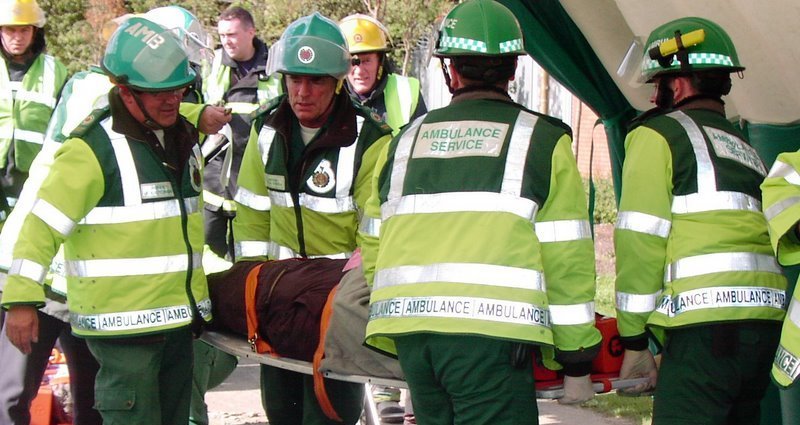Intoduction:
Working shifts can affect a Paramedics health and safety. Shift work can affect performance and attentiveness, which may increase the risk of accidents and injuries. Ambulance personnel have irregular patterns of eating; sleeping, working and socialising that may also lead to health problems.
There is no specific definition of shift work in law, but it is usually taken to mean a work activity scheduled outside standard daytime hours, where there may be a handover of duty from one individual or work group to another; a pattern of work where one employee replaces another on the same job within a 24-hour period Ambulance personnel fit into this category perfectly.
“Normal” hours of work are generally taken to mean a working day with hours left for recreation and rest. Rest is a night time activity, work a daytime activity. This review is concerned with those who work other schedules either on shifts or with extended hours which transcend the day-night work-sleep pattern.
Such abnormal” working hours are not a modern phenomenon. Ramazzini (1633–1714) noted that bakers, innkeepers, and soldiers worked such hours. The advent of the industrial revolution led to many people working long hours until legislation was introduced to curtail the worst vicissitudes of the new factory based economy.
Today, about 1400 National Ambulance service personnel are employed on shift work involving night work and the majority, work extended hours be it through rostered or incidental overtime etc… NAS Shift systems involve periods of 8–12 hours work at a time with the shift crews alternating on two or three shifts in any 24 hour period. The traditional three shifts system in the NAS start at 0800, 1600, and 0000 hours but there are many variations on this and the two shift system from 7am-7pm but again varies from station to station.
Shift work and night work is carried out by NAS personnel to provide health care in an emergency service capacity. Human beings tend towards daytime wakefulness and sleep at night. The body operates on a 24 hour clock, on cycles known as circadian rhythms. Disruption of these rhythms is considered to be the major cause of the harmful effects of shift work, even if absolute proof is lacking so far. Complete adjustment to changing cycles is rare and the ability to do so declines with increasing age.
The major health effects are:
- Increased likelihood of obesity
- Increased risk of cardiovascular disease
- Higher risk of mood changes
- Increased risk of gastrointestinal problems, such as constipation and stomach discomfort
- Higher risk of being involved in a road traffic accident and work-related accidents
- Increased likelihood of family problems, including divorce
In addition :
The sleep deprivation, which can be caused by shift work, may increase the risk of epilepsy in pre-disposed people.
Shift workers with diabetes can experience difficulties in controlling their blood sugar levels
Healthy Eating:
While you know double bacon cheeseburgers are not a good choice when watching your waistline, it's the foods you least suspect that sneak up on you.
When good things turn bad, your health pays the price. The growth of portion sizes, sodium levels and added sugars in foods has transformed healthy meals into unhealthy, nutrient-deficient diet traps.
Fortunately, not all good things must always come to an end. It is possible to eat healthily without forgoing taste and flavour. The key is to find out exactly what you are putting in your mouth. The best way to do this is by reading the nutrition labels. This is a good indicator of what each food contributes to your daily nutrient intake.
It's not just what you read on the label that matters. How you prepare it is another extremely important factor. For instance, imagine you and your friend go out for dinner. You both order a chicken burger and tell the waiter to skip the chips and replace it with a much healthier option, such as soup.
What if I told you that your meal contains almost double the amount of fat and calories as your friend's? You both ordered the chicken, and that's a lean meat, right? You had soup, and that's much better than chips, right? WRONG! Your friend ordered a grilled chicken burger and a tomato soup, and you ordered the fried chicken burger with cream of potato soup.
There is a huge difference between the meals. Understanding these distinctions is the pivotal factor in keeping your health in check.
Too often when you are trying to do the best for your body, you don't take a close enough look at what you are actually eating. Minor modifications can transform most unhealthy foods into healthier counterparts. The problem is that what may seem like common sense when it comes to healthy foods could be misconceptions that you have accepted to be true.
You think you know, but you have no idea.
Fortunately nutritionists do know, and have uncovered the truth about the top 10 foods that can actually derail your diet if you're not careful:
1. Olive oil : Although rich in heart-healthy monounsaturated fats and healthier than butter and margarine, olive oil is still ... oil. More is not better, especially if you're watching your weight.
2. Honey: Sigh... how many times I have heard, "it's natural," as a reason for eating something sweet. It may be natural, but it's still sugar. There's not enough redeeming nutritional value to make it "healthy."
3. Juice : Orange juice. Apple juice. Cranberry juice. To me, juice is the quickest way to gain weight I know. It takes less than a minute for most people to drink 150 calories. Gulp. Gulp again. Watch your thighs expand.
4. Brown bread : Too vague. Think it's healthy just because it says "brown"? It's not. Only whole-wheat counts or wholegrain - any other type has the fibre and germ and all the good nutrition removed in processing.
5. Milk : Whole milk, that is. The old dietary guidelines recommended dairy, at least three servings a day. They didn't differentiate between semi-skimmed and skimmed milk, and the whole milk dairy that contains quite a bit of diet busting fat.
6. Cheese : Many people think that if you don't eat meat, then you can eat cheese for your protein source. This is another quick way to overweight. Cheese, especially full-fat cheese, is full of saturated fat and calories. Compare 30 grams of whole milk mozzarella (80 calories/6 grams of fat/4 grams saturated fat) to 30 grams of turkey breast (30 calories/less than 1 gram of total fat). Treat cheese with caution.
7. Wine : It is now widely accepted that wine and alcohol in general may have some health benefits, but they end at one drink per day for women and two for men. Drink more than that, and the benefits are wiped out by increased risk for disease and addiction.
8 . Fish : Most fish are very healthful - low in saturated fat and a good source of protein. But some fish are less-than-healthful in this country and world-wide because of environmental contamination. It's sad but true. Some of the fish that contain omega-3 fatty acids, like tuna, swordfish, king mackerel and tilefish, also are risky because they may be high in mercury.
Farmed salmon is less healthy than wild salmon; fish caught in local waters may be contaminated with PCPs, so check with your local fish and game advisories. Good choices include fin fish like wild salmon, sole, flounder, bass and snapper. Shellfish is a good choice, as are canned sardines and mackerel; marlin, swordfish and shark are the ones that might be high in mercury.
9 . Low-fat : Just because a biscuit is "low-fat" doesn't mean it's healthier than the original version. In fact, low-fat biscuits contain MORE calories than the original because the manufacturer increases the sugar to make up for the flavour and texture lost with the fat. Have a biscuit if you want one. ONE is the operative word.
10. Chicken : Chicken is a very lean meat ONLY if you remove the skin and don't fry it. I laugh when people tell me that they're eating healthier when they go to a fast-food restaurant for a chicken burger. If they choose the Crispy Chicken sandwich at McDonald's, for example, they get 500 calories and 23 grams of fat; compared to a plain hamburger that only has 260 calories and 9 grams of fat... almost half!
Tips for shift workers:
How to eat, sleep and stay fit when you work unusual hours
Your Officer just posted next weeks roster, and you're on the night shift. You quickly weigh the pros and cons — you'll be able to pick up the kids from school each day. But you'll miss your kids' bath time and bedtime stories.
There's no doubt about it — shift work can be difficult. The demands of juggling alternate work hours and staying connected to family and friends can have a big impact on your health — both mentally and physically. But you can still get enough sleep, eat the right foods, be physically active and maintain social ties — even when you work the night shift.
Fatigue and sleep deficits:
Workers who have to sleep by day often experience difficulties because their body clock does not adjust completely and they are more prone to disturbance. Both the quality and duration of sleep are affected. Sleep deficit and fatigue can build up and affect work, e.g. through the increased possibility of accidents. Gastrointestinal disorders. Irregular food intake associated with night and shift work can lead to stomach complaints. Some studies have found that permanent shift workers are more than twice as likely to suffer from peptic ulcers as day workers. Another study showed that workers on permanent shifts develop peptic ulcers after about five years on average. Cardiovascular disorders. A significant relationship between shift work and heart disease has been reported in a high proportion of studies, especially the more modern ones. Neurological disorders. There is accumulating evidence for an increased incidence of neurological symptoms among shift workers, developing into mental illness. One study reported the average onset period for mental illness in shift workers as less than four years.
In recent years, there has been a growth in 12 hour and longer shifts rather than the more traditional 8 hour period. Much research effort has gone into determining whether or not this imposes extra health effects with inconclusive results to date. It would seem that circadian disruption, fatigue and sleep deficit would be exacerbated by a 12 hour system. Other factors need to be considered, e.g. exposure to toxic materials where limits appropriate for 8 hours would no longer be safe for 12 hours.
Sleep tips :
Changing your normal rhythm of waking and sleeping as a result of switching shifts requires a period of adjustment. If you've ever flown across multiple time zones, you know what can happen when your body's internal clock is disrupted. Insomnia, mental and physical fatigue, indigestion, and an overall feeling of ill health are common.
If your job requires you to constantly change shifts, your body will have more difficulty adjusting and readjusting as you get older. Here are some strategies to help you sleep well:
Develop a pre-bedtime ritual. Read the paper, listen to soft music or take a warm bath before going to bed. Allow yourself to unwind from your shift.
Set your environment for sleeping. Sleep in a dark room. Use room-darkening shades or wear a sleep mask. Wear earplugs or run a fan to block out daytime noises and make sleep easier.
Maintain your sleep schedule. If at all possible, keep a consistent sleep schedule. Stick to the same sleep hours every day — even on your days off.
Change the sequence. A more normal sleep pattern results when your shift sequence is day-evening-night rather than day-night-evening.
Take naps. A short nap — maybe 30 minutes — before your evening shift can help you feel refreshed and more alert at work. Rouse yourself well before your shift starts, though, in case you feel groggy when you first wake up.
Sleeping pills:
If you experience severe insomnia, ask your doctor about a short-acting sleeping pill..
Foods that can interfere with sleep:
Some components of food, such as caffeine, artificially wake us up, so it makes no sense to have stimulant-containing foods before bed. Unfortunately, this applies not only to coffee, but to all caffeine-containing foods, and to theophylline-containing foods (like black tea) as well. Chocolate and many soft drinks (including diet soft drinks) have substantial amounts of caffeine. An ounce of chocolate can contain 10-60 mg of caffeine, and a soft drink will usually fall into this same range. Brewed coffee can have over 100 mg per cup, depending on the grind and brewing time. Eliminating these foods from your evening meal routine is recommended for improved sleep.
Other foods to avoid:
•Alcohol and nicotine. Do not use alcohol to help you fall asleep. Although alcohol may initially induce sleep, once it wears off, the sleep tends to be fragmented. Also, limit nicotine prior to bedtime, as it is a stimulant and will keep you up.
• Heavy meals less than three hours prior to bed. Meals loaded with calories and fat rev up active digestion and can often leave you feeling uncomfortably full or, even worse, cause heartburn or aggravate a hiatus hernia.
• Fatty or spicy foods
• Tomatoes
• Potatoes
• Salt
• Onions
Nutrition tips:
Shift workers may find it difficult to make healthy food choices because what's most readily available in the middle of the night comes from vending machines and 24-hour fast-food restaurants. Unhealthy eating isn't necessarily a given, though. Here are some tips to help you eat well:
Brown bag it. Bringing food from home will make you less tempted to raid the vending machines. Pack a healthy lunch that includes plenty of fruits and vegetables.
Eat smaller portions. Aim for smaller portions, such as a couple of quick, healthy snacks, during your shift rather than eating a big meal. Shift work can interfere with your body's regular digestive routine. Eating light can reduce the chance of an upset stomach — especially if you're working through the night — because heavier meals are more difficult to digest and can give you heartburn.
Avoid late-night caffeine. Have caffeinated drinks before your shift or early during your shift. Avoid too much caffeine or caffeine late in your shift — it can make it hard for you to fall asleep after you get home.
Exercise tips :
Shift work doesn't mean you can't exercise. Scheduling regular exercise is important — it may help improve your sleep, your energy level and your mood. Don't know if you can fit it into your day — or night? Here are some tips to get the job done:
Work out before work. Twenty minutes of aerobic activity, such as brisk walking, jogging or swimming, on most days can help you stay alert on the job. It also keeps your heart in tip-top shape.
On the job:
During work, use the time in between calls to exercise. Take a lap around your building. Keep a resistance band or hand weights at work for strength training.
Don't take the shortcut. Work exercise into your normal routine. Walk or bike to work instead of driving. Climb the stairs instead of riding the elevator.
Find a buddy. Find a co-worker and exercise together. It'll make exercising more fun and will also help keep you motivated.
Social tips:
Shift work makes it tough to maintain social ties — after all, you'll be working when most people are socializing. Here are some tips to help you maintain social ties:
Phone home. Make time to call home and talk with your kids and spouse, whether it's just before bedtime or just after the sun rises.
Publicize your hours. Let your family and friends know your work schedule. Make time for get-togethers on your days off to keep in touch.
Get creative. Make a breakfast date — it'll be a nice end-of-the-day treat for you and a nice start-of-the-day treat for someone else.
Summary;
Shift work can affect health. The body is synchronised to night and day by a part of the brain known as the circadian clock. A shift worker confuses their circadian clock by working when their body is programmed to be sleeping. Common health problems include sleep disorders, digestive upsets, obesity and heart disease. The ability to adjust to shift work is different for every person. You may be happy working alternate hours or you may find it extremely frustrating. If you feel that your work hours are impacting your health and well-being, it may be time to consider changing your job.





